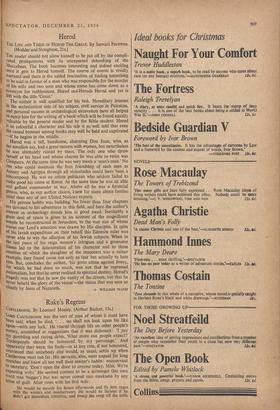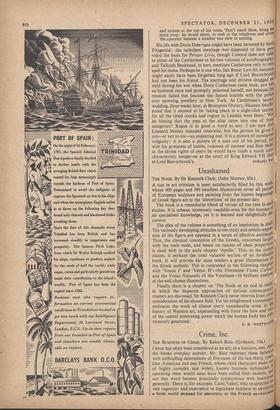Rake's Regress
CASTLEROSSE. By Leonard Mosley. (Arthur Barker, 15s.) it:ORD CASTLEROSSE was the sort of man of whom it must have °Cen said, when he died, `. . . we shall not look upon his like again—with any luck.' He roared through life on other people's money, astonished at suggestions that it was dishonest : 'I pay 1113' gambling and racing debts. What more can people expect? Tradespeople radespeople should be honoured by my patronage.' And apparently they were, the fools—or at any rate, if not honoured, convinced that somebody else would, as usual, settle up when Castlerosse went too far. His servants, also, went unpaid for long !stretches and knew all too well their master's habits : manservant to secretary, 'Don't open the door to anyone today, Miss. We're expecting writs.' He seemed content to be a scrounger (his own word was 'beggar') but was never cowed into meekness by any sense of guilt. After rows with his first wife: He would be moody for hours afterwards and fly into rages . the waiters and maidservants. He would be furious if he didn't get immediate attention, and sweep the soup 'off the table and scream at the top of his voice. 'Don't stand there, bring Itta more soup, he would shout, or rush to the telephone and buse'l the operator because a number was slow in coming.
His life with Doris Delavigne might have been invented by Scott Fitzgerald : the turbulent marriage was supposed to have pro.1 vided the basis for Private Lives, though Coward does not refer to either of the Castlerosses in his two volumes of autobiogra phY; and Tallulah Bankhead, in hers, mentions Castlerosse only to mis' spell his name. Perhaps he is one who, like Bonar Law for instance might easily have been forgotten long ago if Lord Beaverbrool; had not been his friend. The marriage and divorce dragged on until during the war when Doris Castlerosse came back, saw het ex-husband once and promptly poisoned herself, not because the reunion failed but because she feared trouble with the police over pawning jewellery in New York. At Castlerosse's second wedding, three weeks later, in Brompton Oratory, Hannen Swaffes noted that it seemed to be 'taking place in a night-club setting. for all the titled crooks and rogues in London were there.' Was he hinting that the man at the altar came into one of 1 hese categories? Rogue is as good a word as any. I am sure that Leonard Mosley intended otherwise, but the picture he gives i5 not—or not to me—an endearing one. It is a picture of unrelieved vulgarity : it is also a picture of a man out of his period, Or with his grossness of habits, rudeness of manner and firm belief in the divine rights of peers he would have made a much more characteristic hanger-on at the court of King Edward VII than



































 Previous page
Previous page